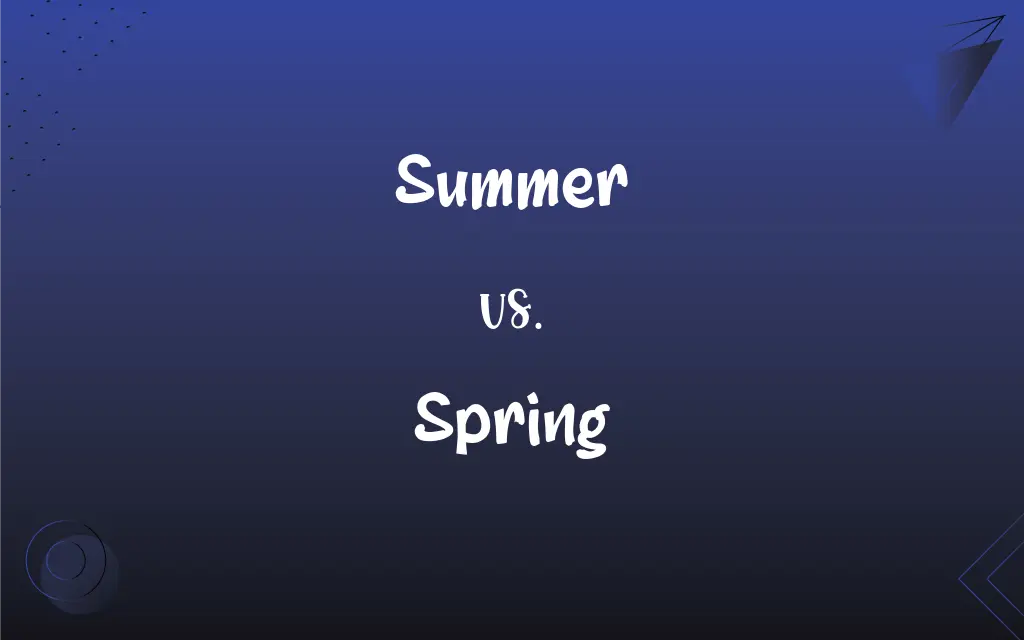Summer vs. Spring: What's the Difference?
Edited by Aimie Carlson || By Janet White || Updated on October 17, 2023
"Summer" is not an incorrect spelling for "Spring." Spring refers to one of the four seasons, preceding summer.

Key Differences
"Summer" starts with 'Sum', while "Spring" starts with 'Spr'.
"Summer" has two 'm's, while "Spring" has one 'm'.
"Spring" contains the letter 'g' at the end, "Summer" does not.
"Spring" is associated with blossoming, while "Summer" is associated with warmth.
"Summer" is longer with 6 letters, while "Spring" has 6 as well but is pronounced quicker.
ADVERTISEMENT
Summer and Spring Definitions
Summer
Summer is an incorrect spelling of Spring.
Spring
A resilient device, typically helical, that can be pressed or pulled and then returns to its original shape.
The mattress has a broken spring.
Spring
To arise or originate from.
Rumors spring from baseless fears.
Spring
To move upward or forward in a single quick motion or a series of such motions; leap
The goat sprang over the log.
Spring
To move suddenly, especially because of being resilient or moved by a spring
I let the branch spring forward. The door sprang shut.
ADVERTISEMENT
Spring
To start doing something suddenly
The firefighters sprang into action.
Spring
To appear or come into being quickly
New businesses are springing up rapidly.
Spring
To issue or emerge suddenly
A cry sprang from her lips. A thought springs to mind.
Spring
To arise from a source; develop
Their frustration springs from a misunderstanding.
Spring
(intransitive) To burst forth.
Spring
(of liquids) To gush, to flow suddenly and violently.
The boat sprang a leak and began to sink.
Spring
To gush, to flow out of the ground.
Spring
(of light) To appear, to dawn.
Spring
(of plants) To sprout, to grow,
Spring
(now chiefly botanical) To grow taller or longer.
Spring
To rise from cover.
Spring
(of landscape) To come dramatically into view.
Spring
(figurative) to arise, to come into existence.
Hope springs eternal.
He hit the gas and the car sprang to life.
Spring
To move with great speed and energy; to leap, to jump; to dart, to sprint; of people: to rise rapidly from a seat, bed, etc.
Deer spring with their hind legs, using their front hooves to steady themselves.
He sprang to his feet.
A bow, when bent, springs back by its elastic power.
Don't worry. She'll spring back to her cheerful old self in no time.
It was the first thing that sprang to mind.
She sprang to her husband's defense and clocked the protestor.
Spring
(usually with from) To be born, descend, or originate from
He sprang from peasant stock.
Spring
To descend or originate from.
The Stoics sprang from the Cynics.
Spring
(obsolete) To rise in social position or military rank, to be promoted.
Spring
To become known, to spread.
Spring
To emit, to spread.
Spring
To grow.
Spring
(transitive) To cause to burst forth.
Spring
To cause to well up or flow out of the ground.
Spring
To bring forth.
Spring
To cause to become known, to tell of.
Spring
To cause to move energetically; (equestrianism) to cause to gallop, to spur.
Spring
To cause to rise from cover.
His dogs sprang the grouse and partridges and flushed the woodcock.
Spring
To shift quickly from one designated position to another.
Spring
To breed with, to impregnate.
Spring
(of mechanisms) To cause to work or open by sudden application of pressure.
He sprang the trap.
Spring
To make wet, to moisten.
Spring
To rise suddenly, (of tears) to well up.
The documentary made tears spring to their eyes.
Spring
To burst into pieces, to explode, to shatter.
Spring
To go off.
Spring
To cause to explode, to set off, to detonate.
Spring
To crack.
Spring
To have something crack.
Spring
To cause to crack.
Spring
To surprise by sudden or deft action.
Spring
To come upon and flush out
Spring
To catch in an illegal act or compromising position.
Spring
(obsolete) To begin something.
Spring
(obsolete) To produce, provide, or place an item unexpectedly.
Spring
To put bad money into circulation.
Spring
To tell, to share.
Spring
(of news, surprises) To announce unexpectedly, to reveal.
Sorry to spring it on you like this but I've been offered another job.
Spring
To free from imprisonment, especially by facilitating an illegal escape.
His lieutenants hired a team of miners to help spring him.
Spring
To be free of imprisonment, especially by illegal escape.
Spring
To build, to form the initial curve of.
They sprung an arch over the lintel.
Spring
To extend, to curve.
The arches spring from the front posts.
Spring
To turn a vessel using a spring attached to its anchor cable.
Spring
To raise a vessel's sheer.
Spring
To raise a last's toe.
Spring
(transitive) To pay or spend a certain sum, to cough up.
Spring
To raise an offered price.
Spring
To act as a spring: to strongly rebound.
Spring
To equip with springs, especially to equip with a suspension.
Spring
To provide spring or elasticity
Spring
To inspire, to motivate.
Spring
(ambitransitive) To deform owing to excessive pressure, to become warped; to intentionally deform in order to position and then straighten in place.
A piece of timber sometimes springs in seasoning.
He sprang in the slat.
Spring
To reach maturity, to be fully grown.
Spring
To swell with milk or pregnancy.
Spring
To sound, to play.
Spring
(intransitive) To spend the springtime somewhere
Spring
(of animals) to find or get enough food during springtime.
Spring
(countable) An act of springing: a leap, a jump.
Spring
(countable) The season of the year in temperate regions in which plants spring from the ground and into bloom and dormant animals spring to life.
Spring is the time of the year most species reproduce.
You can visit me in the spring, when the weather is bearable.
Spring
(astronomy) The period from the moment of vernal equinox (around March 21 in the Northern Hemisphere) to the moment of the summer solstice (around June 21); the equivalent periods reckoned in other cultures and calendars.
Spring Festival" throughout East Asia because it is reckoned as the beginning of their spring.
Spring
(meteorology) The three months of March, April, and May in the Northern Hemisphere and September, October, and November in the Southern Hemisphere.
I spent my spring holidays in Morocco.
The spring issue will be out next week.
Spring
The time of something's growth; the early stages of some process.
Spring
A period of political liberalization and democratization
Arab Spring
Spring
Someone with ivory or peach skin tone and eyes and hair that are not extremely dark, seen as best suited to certain colors of clothing.
Spring
(countable) Something which springs, springs forth, springs up, or springs back, particularly
Spring
(geology) A spray or body of water springing from the ground.
This beer was brewed with pure spring water.
Spring
The rising of the sea at high tide.
Spring
(oceanography) nodot=a, the especially high tide shortly after full and new moons.
Neap tide
Spring
A mechanical device made of flexible or coiled material that exerts force and attempts to spring back when bent, compressed, or stretched.
We jumped so hard the bed springs broke.
Spring
(nautical) A line from a vessel's end or side to its anchor cable used to diminish or control its movement.
Spring
(nautical) A line laid out from a vessel's end to the opposite end of an adjacent vessel or mooring to diminish or control its movement.
You should put a couple of springs onto the jetty to stop the boat moving so much.
Spring
(figurative) A race, a lineage.
Spring
(figurative) A youth.
Spring
A shoot, a young tree.
Spring
A grove of trees; a forest.
Spring
An erection of the penis. en
Spring
A crack which has sprung up in a mast, spar, or (rare) a plank or seam.
Spring
(uncountable) Springiness: an attribute or quality of springing, springing up, or springing back, particularly
Spring
Elasticity: the property of a body springing back to its original form after compression, stretching, etc.
The spring of a bow
Spring
Elastic energy, power, or force.
Spring
(countable) The source from which an action or supply of something springs.
Spring
(countable) Something which causes others or another to spring forth or spring into action, particularly
Spring
A cause, a motive, etc.
Spring
(obsolete) A lively piece of music.
Spring
To leap; to bound; to jump.
The mountain stag that springsFrom height to height, and bounds along the plains.
Spring
To issue with speed and violence; to move with activity; to dart; to shoot.
And sudden lightSprung through the vaulted roof.
Spring
To start or rise suddenly, as from a covert.
Watchful as fowlers when their game will spring.
Spring
To fly back; as, a bow, when bent, springs back by its elastic power.
Spring
To bend from a straight direction or plane surface; to become warped; as, a piece of timber, or a plank, sometimes springs in seasoning.
Spring
To shoot up, out, or forth; to come to the light; to begin to appear; to emerge; as a plant from its seed, as streams from their source, and the like; - often followed by up, forth, or out.
Till well nigh the day began to spring.
To satisfy the desolate and waste ground, and to cause the bud of the tender herb to spring forth.
Do not blast my springing hopes.
O, spring to light; auspicious Babe, be born.
Spring
To issue or proceed, as from a parent or ancestor; to result, as from a cause, motive, reason, or principle.
[They found] new hope to springOut of despair, joy, but with fear yet linked.
Spring
To grow; to thrive; to prosper.
What makes all this, but Jupiter the king,At whose command we perish, and we spring?
Spring
To cause to spring up; to start or rouse, as game; to cause to rise from the earth, or from a covert; as, to spring a pheasant.
Spring
To produce or disclose suddenly or unexpectedly; as, to spring a surprise on someone; to spring a joke.
She starts, and leaves her bed, and springs a light.
The friends to the cause sprang a new project.
Spring
To cause to explode; as, to spring a mine.
Spring
To crack or split; to bend or strain so as to weaken; as, to spring a mast or a yard.
Spring
To cause to close suddenly, as the parts of a trap operated by a spring; as, to spring a trap.
Spring
To bend by force, as something stiff or strong; to force or put by bending, as a beam into its sockets, and allowing it to straighten when in place; - often with in, out, etc.; as, to spring in a slat or a bar.
Spring
To pass over by leaping; as, to spring a fence.
Spring
To release (a person) from confinement, especially from a prison.
Spring
A leap; a bound; a jump.
The prisoner, with a spring, from prison broke.
Spring
A flying back; the resilience of a body recovering its former state by its elasticity; as, the spring of a bow.
Spring
Elastic power or force.
Heavens! what a spring was in his arm!
Spring
An elastic body of any kind, as steel, India rubber, tough wood, or compressed air, used for various mechanical purposes, as receiving and imparting power, diminishing concussion, regulating motion, measuring weight or other force.
Spring
Any source of supply; especially, the source from which a stream proceeds; an issue of water from the earth; a natural fountain.
Spring
Any active power; that by which action, or motion, is produced or propagated; cause; origin; motive.
Our author shuns by vulgar springs to moveThe hero's glory, or the virgin's love.
Spring
That which springs, or is originated, from a source;
Spring
That which causes one to spring; specifically, a lively tune.
Spring
The season of the year when plants begin to vegetate and grow; the vernal season, usually comprehending the months of March, April, and May, in the middle latitudes north of the equator.
Spring
The time of growth and progress; early portion; first stage; as, the spring of life.
O how this spring of love resemblethThe uncertain glory of an April day.
Spring
A crack or fissure in a mast or yard, running obliquely or transversely.
Spring
The season of growth;
The emerging buds were a sure sign of spring
He will hold office until the spring of next year
Spring
A natural flow of ground water
Spring
A metal elastic device that returns to its shape or position when pushed or pulled or pressed;
The spring was broken
Spring
A light springing movement upwards or forwards
Spring
The elasticity of something that can be stretched and returns to its original length
Spring
A point at which water issues forth
Spring
Move forward by leaps and bounds;
The horse bounded across the meadow
The child leapt across the puddle
Can you jump over the fence?
Spring
Develop into a distinctive entity;
Our plans began to take shape
Spring
Spring back; spring away from an impact;
The rubber ball bounced
These particles do not resile but they unite after they collide
Spring
Produce or disclose suddenly or unexpectedly;
He sprang a new haircut on his wife
Spring
Develop suddenly;
The tire sprang a leak
Spring
Produce or disclose suddenly or unexpectedly;
He sprang these news on me just as I was leaving
Spring
One of the four seasons, following winter.
Flowers bloom during Spring.
Spring
The origin or source of something.
This river is the spring of our village.
Spring
An upward jump or leap.
The cat gave a sudden spring into the air.
FAQs
Why is it called Spring?
It's called "Spring" due to the idea of nature "springing" back to life after winter.
Which conjunction is used with Spring?
Any conjunction can be used, depending on the sentence.
Which vowel is used before Spring?
The vowel "i" is used in "Spring."
Which preposition is used with Spring?
"In" as in "in Spring."
What is the verb form of Spring?
The verb form is "to spring."
What is the pronunciation of Spring?
It is pronounced as /sprɪŋ/.
What is the root word of Spring?
The root word is "spring."
What is the singular form of Spring?
The singular form is "Spring."
What is the plural form of Spring?
The plural form is "Springs."
Is Spring a noun or adjective?
"Spring" can be both, e.g., "Spring weather" (adjective) or "the Spring season" (noun).
Is Spring an abstract noun?
No, it can be concrete (like a coil) or represent a season.
Is Spring an adverb?
No, "Spring" is not an adverb.
Is Spring a vowel or consonant?
"Spring" is a word containing both vowels and consonants.
Is Spring a collective noun?
No, it is not.
Is Spring a negative or positive word?
Generally perceived as positive due to associations with renewal.
Is the Spring term a metaphor?
It can be used metaphorically, e.g., "spring of youth."
What is the opposite of Spring?
"Fall" or "Autumn" as a season. As an action, "sink" or "settle."
What part of speech is Spring?
It can be a noun or verb, depending on usage.
What is the first form of Spring?
The base form is "spring."
Is Spring a countable noun?
Yes, when referring to the device (e.g., springs in a mattress).
Is the word Spring is imperative?
No, it is not imperative.
How many syllables are in Spring?
There is one syllable in "Spring."
How do we divide Spring into syllables?
It is not divided; it's a single syllable.
Which determiner is used with Spring?
Determiners like "a," "the," "this," "that," "my," "his," "her," etc. can be used depending on context.
What is the second form of Spring?
The past tense is "sprang."
What is the third form of Spring?
The past participle is "sprung."
How is Spring used in a sentence?
"The flowers begin to bloom in Spring."
Which article is used with Spring?
Both "a" and "the" can be used, e.g., "a spring" or "the spring."
What is a stressed syllable in Spring?
The single syllable in "Spring" is stressed.
What is another term for Spring?
For the season, "vernal" can be used. For the device, "coil" can be an alternative.
About Author
Written by
Janet WhiteJanet White has been an esteemed writer and blogger for Difference Wiki. Holding a Master's degree in Science and Medical Journalism from the prestigious Boston University, she has consistently demonstrated her expertise and passion for her field. When she's not immersed in her work, Janet relishes her time exercising, delving into a good book, and cherishing moments with friends and family.
Edited by
Aimie CarlsonAimie Carlson, holding a master's degree in English literature, is a fervent English language enthusiast. She lends her writing talents to Difference Wiki, a prominent website that specializes in comparisons, offering readers insightful analyses that both captivate and inform.































































